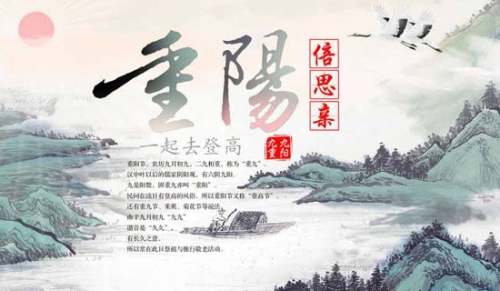重阳节用英语怎么说
重阳节用英语怎么说
在学习、工作乃至生活中,大家都跟作文打过交道吧,借助作文可以提高我们的语言组织能力。你写作文时总是无从下笔?下面是小编收集整理的重阳节用英语怎么说,希望能够帮助到大家。

重阳节
[释义] Double Ninth Festival; 农历九月初九,二九相重,称为重九,九是阳数,固重九亦叫重阳.重阳这天所有亲人都要一起登高避灾,插茱萸、赏菊花;
The Double Ninth Festival
the ninth day of the ninth lunar month
The "Chong Yang Festival" is celebrated on the ninth day of the ninth lunar month, and it is as such known as the Double Ninth Festival.
Origins: The festival began as early as the Warring States Period (475 - 221 BC). According to the yin/yang dichotomy that forms a basis to the Chinese world view, yin represents the elements of darkness and yang represents life and brightness. The number nine is regarded as yang. The ninth day of the ninth month is a double yang day, hence the name "Chong Yang Festival". (Chong means "repeat" in Chinese.) The ninth month also heralds the approach of winter. It is a time when the living need warm clothing, and filial Chinese sons and daughters extended this to make the festival a time for providing winter clothes for their ancestors. The Double Ninth Festival, therefore, also became an occasion to visit the graves of dead family members. Clothes made of paper would then be burnt as offerings.
Climbing mountains: On the Double Ninth Festival, people customarily climb mountains, appreciate chrysanthemum flowers, drink chrysanthemum wine, and eat double-ninth cakes. The Double Ninth Festival is also the "Old Men Festival". Old people are especially meant to improve their health by taking part in the activities on the day of the festival.
Family get-togethers: The Double Ninth Festival is also a time for family get-togethers. It is an occasion to remember ones ancestors, the sacrifices they made and the hardships they underwent. Often, family outings are organised during which people search to renew their appreciation of nature and to reaffirm their love and concern for family members and close friends.
重阳节英语资料
This practice came from an ancient folktale. It is said long ago there appeared a devil of plaguein the Ruhe River. People lay down and died wherever it came up. A boy named Heng Jing swore to help his neighbors and fellow people to get rid of it. He visited many famous mountains to seek a powerful master. Finally an old Taoist took him in and taught him how to defeat the devil. Heng Jing put his whole heart into study and practice.
One day, the Taoist called him up and said, Heng Jing, tomorrow is the 9th day of September and the devil will reappear. It is time for you to go home and stop the devil. The master also gave him a pack of leaves of Cornus and a jar of liquor soaked with chrysanthemums. Riding a crane, Heng Jing went a great distance back home in a day. As instructed by his master, he told his fellow villagers to climb up the nearby mountain with a Cornus leaf pinned on their clothes and a glass of chrysanthemum liquor in hand.
When the devil of plague came up from under the water, it got dizzy by the scent of Cornus and chrysanthemums. Heng Jing fought with his masters sword and killed the devil in a few rounds. People held parties, drank chrysanthemum liquor to celebrate it. And the next year, the custom of mountain climbing became popular among the villagers.
In the golden September, chrysanthemum blooms, reminding people of the folktale. And later a special cake with dates, chestnuts and meat was made to add more festivity to the special day.
